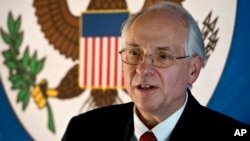The United States' Special Envoy to Sudan and South Sudan, Donald Booth, said Monday that delegates at the African Union summit have endorsed a proposal by East African bloc IGAD to significantly expand the number of mediators at South Sudan’s peace talks.
The expanded mediation process adds the troika – made up of the United States, United Kingdom and Norway –, the United Nations, China, the African Union, the European Union and five African nations to the list of mediators trying to restore peace in South Sudan. The expanded set of negotiators has been dubbed IGAD-Plus.
In a telephone news conference from Johannesburg, where the A.U. summit was held, Booth said the expanded mediation team was expected to meet "in the very near future to discuss the substance of the way forward.”
IGAD power-sharing blueprint
Booth also commented on a document in which IGAD outlines how it envisages power being shared in South Sudan after a peace deal is reached. The document was given to government and opposition negotiators last week in Addis Ababa.
Booth said the warring parties are "taking a serious look" at the IGAD document.
"Inevitably, both sides will have some concerns but what is needed and has been stressed repeatedly is that, in order to achieve peace, there needs to be the leadership demonstrated to make the compromises for peace," Booth said.
Latest attempt to restore peace
IGAD-Plus and the five-page document on power-sharing are the latest of many attempts by the East African bloc to bring peace to South Sudan.
President Kiir and Machar signed a cessation of hostilities agreement last January but it was violated almost immediately. The most recent round of talks ended in early March without a binding agreement to end the conflict.
Booth said the failure of South Sudan’s leaders to reach a peace deal is prolonging the suffering of the people of South Sudan.
"In the last two months, because of the uptick in fighting, another roughly 150,000 South Sudanese have been displaced," Booth said.
"The U.N. estimate is that, as of early July, close to 4.6 million South Sudanese will be on the verge of life-threatening hunger. That’s 40 percent of the population. So the idea that fighting is only in small pockets of the country is definitely not an accurate reflection of the situation," he said, adding that people around the country face alarming food and physical insecurity because of the conflict.
Booth said the only way to help the people of South Sudan is for the warring sides to work together and reach a lasting peace agreement to end the 18-month-old conflict.






